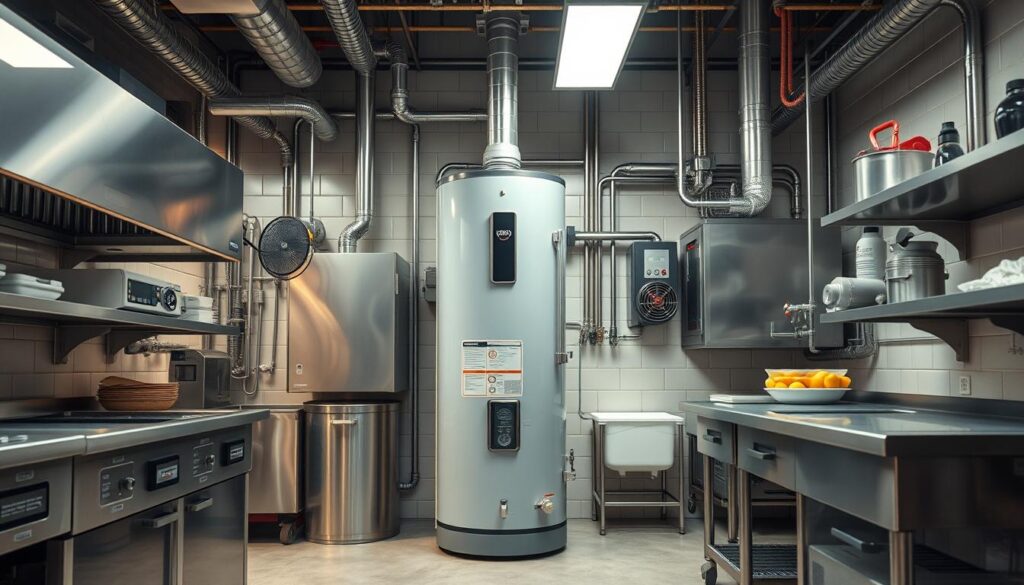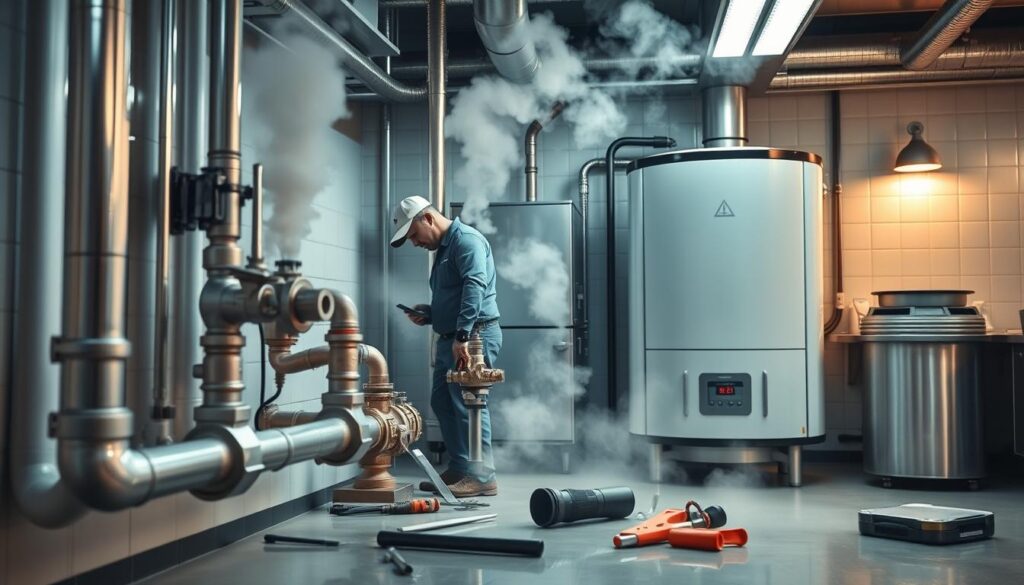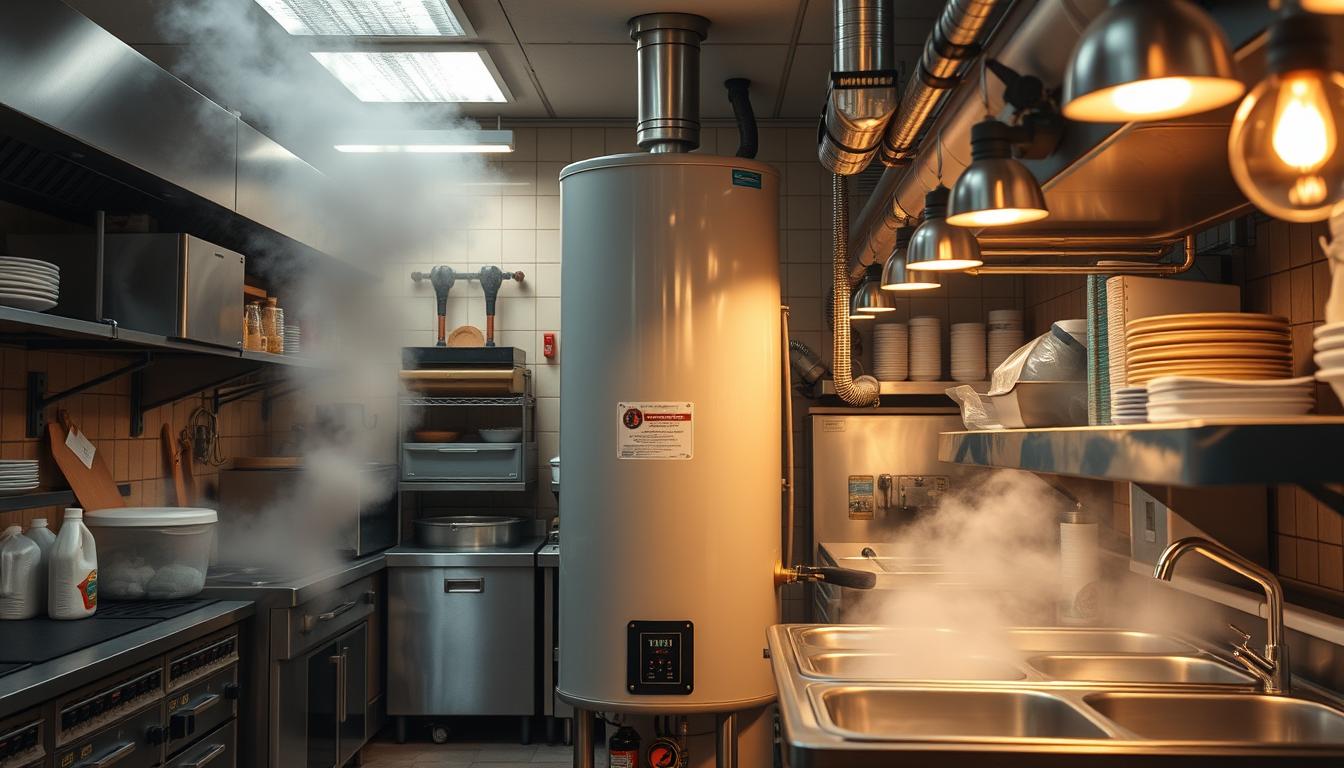North Carolina’s food service industry has big challenges. They must keep water heating systems working right. The 2017 Food Code, starting October 1st, 2021, sets clear rules for water heaters and hot water in food places.
Knowing about the water heater recovery rate in North Carolina is key. It helps restaurant owners and managers keep food safe and clean. It also makes sure everything runs smoothly in the state’s many food places.
Food places have to follow many rules about water heating. They need to control temperatures, meet recovery rates, and be ready for emergencies. Following these rules keeps everyone safe and healthy.
Key Takeaways
- North Carolina follows strict 2017 Food Code regulations for water heating systems
- Commercial water heaters must maintain specific recovery rates and temperatures
- Food safety depends on consistent hot water availability
- Regular maintenance is crucial for water heating equipment
- Emergency operational plans must address water heating contingencies
- Energy-efficient water heaters can reduce operational costs
Understanding Water Heater Systems for NC Food Service Establishments
Choosing the right water heater is key for North Carolina food places. Owners need to look at both tankless and tank-style systems. This ensures they work well and save energy.
Tank-Style vs Tankless Water Heaters
There are two main water heating choices: tank-style and tankless. Tankless systems are great for restaurants because they:
- Make hot water when you need it
- Use less energy
- Save space
- Keep water clean
Capacity vs Recovery Rate Differences
It’s important to know about water heater capacity and recovery rate. Capacity is how much hot water is ready right. Recovery rate is how fast water heats up when it’s needed a lot.
| Metric | Tank-Style Heaters | Tankless Heaters |
|---|---|---|
| Water Storage | Fixed Volume | On-Demand |
| Recovery Speed | 40-60 Minutes | Instant |
Flow Rate Considerations for Commercial Kitchens
Commercial kitchens need to think about hot water flow rate. Managers should check how much water their kitchen uses. This helps pick the right system for their needs.
“Choosing the right water heater is not just about capacity, but matching your kitchen’s specific hot water needs.” – Restaurant Equipment Specialist
Knowing your kitchen’s flow rate is key. It makes sure you have hot water when you need it. This keeps your kitchen running smoothly.
North Carolina Food Establishment Water Heater Recovery Rate Requirements
NC food code rules set clear standards for water heaters in food places. The 2017 Food Code gives detailed rules to keep food safe and clean. This is done by managing water temperature well.

- Keeping hot water steady for washing dishes
- Having enough water during busy times
- Following health guidelines for cleaning
“Proper water heating is not just about temperature, but consistent performance during high-demand periods.”
Standards for water heaters in kitchens are clear. Dishwashing stations need water between 110-120°F to clean well. Handwashing areas have their own temperature needs for safety and cleaning.
The North Carolina Department of Health says to check water heater systems often. Restaurants should look at both tank and tankless systems. They need to think about their kitchen’s needs and how fast they can heat water.
| Water Heater Type | Recovery Rate | Compliance Level |
|---|---|---|
| Tank-Style | Gallons per Hour | Standard Compliance |
| Tankless | Continuous Flow | Advanced Compliance |
Food places must take care of their water heating systems. They need to follow strict NC food code rules. This keeps their kitchens clean and safe.
Essential Components of Commercial Water Heating Systems
Understanding commercial water heating systems is key. Food service places need strong water heating to work well, stay safe, and follow rules.
Temperature Control and Monitoring Systems
Keeping water at the right temperature is vital. Advanced monitoring tools help control water temperature. They check water temperature many times a second to make sure hot water is always ready.
- Real-time temperature tracking
- Automated safety shut-off mechanisms
- Precision temperature management
Emergency Operations Planning
Having a plan for emergencies is crucial. Restaurants need plans for when water heaters fail or when there’s no power.
Being ready is the best way to handle unexpected problems.
| Emergency Scenario | Recommended Action |
|---|---|
| Water Heater Failure | Activate backup water heater system |
| Power Outage | Implement portable water heating solutions |
Maintenance and Compliance Standards
Keeping water heaters in good shape is important. Regular checks make sure everything meets health rules.

- Quarterly system performance assessments
- Annual comprehensive equipment inspections
- Detailed record-keeping for regulatory compliance
Regular upkeep stops big problems and keeps food service running smoothly.
Conclusion
Keeping NC food places safe and good is very important. Making sure water heaters work well helps a lot. Owners need to know and use the best ways to heat water, following health rules.
Kitchens need strong water heating to work well and reliably. Using the right tech and keeping it up helps avoid problems. A good water heating system keeps things running smoothly and cuts down on surprises.
Managing water heating needs ongoing learning and keeping up with new things. Managers should know about new tech and rules. Chefs can find cool kitchen ideas at professional culinary techniques sites.
In the end, good NC food places see water heaters as key to success. They follow strict maintenance and use the latest tech. This way, they offer safe, efficient places for great food.
FAQ
What is the difference between water heater capacity and recovery rate?
Water heater capacity is how much hot water it can hold. Recovery rate is how fast it can heat water again. For restaurants, fast recovery is key to keep water hot during busy times.
What are the advantages of tankless water heaters for food service establishments?
Tankless water heaters give hot water when you need it. They save energy and don’t grow bacteria. They also save space and work well in small kitchens.
What are the minimum hot water temperature requirements for commercial kitchens in North Carolina?
In North Carolina, water for washing dishes must be 160-180°F. Hand washing stations need water at least 100°F. This keeps food safe and clean.
How do I calculate the appropriate hot water flow rate for my restaurant?
Think about your kitchen’s needs. Count your sinks, dishwashers, and prep stations. Also, think about when you use the most water. A pro can help figure out what you need.
What emergency preparations should I have for potential hot water system disruptions?
Make a plan for when hot water stops. Include what to do in power outages or system failures. Have backup plans and know how to keep food safe.
How often should commercial water heating systems be maintained?
Check your system every quarter and service it yearly. Clean it often too. Keep records to show you’re following health rules. Watch for signs of trouble.
What are the key considerations when choosing a water heater for a food service establishment?
Think about how fast it heats water, how much water it uses, and how efficient it is. Also, consider space and health rules. Think about your kitchen’s needs and costs over time.
How can I prevent Legionella bacteria growth in my commercial water heating system?
Keep water over 140°F and use tankless systems. Regular maintenance and good water flow help too. Use tech that keeps water temperature steady to fight bacteria.

